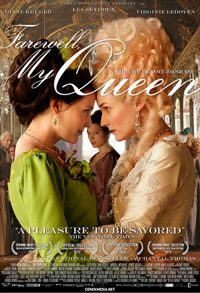Reviews
Farewell, My Queen | Review
Moi Petite Reader: Underrated Jacquot Depicts Decadence on the Eve of Doom
 The first of underrated Gallic master Benoît Jacquot’s films to reach theaters on US Shores since 2004 (he’s had steady output since then, however) is the extremely enjoyable, Farewell, My Queen. Based on a novel by Chantal Thomas, we’re witness to the last week of Marie Antoinette’s reign, as told through the eyes of a member of her court. Jacquot, whose films are often showcases for France’s most talented actresses, having crafted films for Isabelle Huppert, Isild Le Besco, and Virginie Ledoyen, is also no stranger to period royalty pieces, having helmed a 2004 film for French television concerning Princess Marie Bonaparte, starring Catherine Deneuve. With his latest effort, he’s given us a heady concoction of historical intrigue, with a tart hint of salaciousness that drains away the generally unrealistic nature of supposedly authentic reenactments.
The first of underrated Gallic master Benoît Jacquot’s films to reach theaters on US Shores since 2004 (he’s had steady output since then, however) is the extremely enjoyable, Farewell, My Queen. Based on a novel by Chantal Thomas, we’re witness to the last week of Marie Antoinette’s reign, as told through the eyes of a member of her court. Jacquot, whose films are often showcases for France’s most talented actresses, having crafted films for Isabelle Huppert, Isild Le Besco, and Virginie Ledoyen, is also no stranger to period royalty pieces, having helmed a 2004 film for French television concerning Princess Marie Bonaparte, starring Catherine Deneuve. With his latest effort, he’s given us a heady concoction of historical intrigue, with a tart hint of salaciousness that drains away the generally unrealistic nature of supposedly authentic reenactments.
It’s July 14th, 1789, and Sidonie Laborde (Seydoux), has been summoned to read to Marie Antoinette (Kruger), with whom it’s immediately evident a flirtatious connection exists. But Sidonie is not the object of the Queen’s affection, who is, in fact, notoriously obsessed with Duchess Gabrielle de Polignac (Ledoyen). But Versailles is about to be turned upside down, as the very next morning news hits that the Bastille was stormed. A list of names is circulated of those the people wish to behead, of which the King and Queen are at the top. As revolution looms, the ridiculous self absorption of the Queen becomes ever more apparent, more distraught she has brought the ire of the people against her lover. Her complete obliviousness leads her into a fraught confidence with her eager reader, whom she uses to quell a lover’s tiff, and later, as bait. With only days left before history meets up with us, Sidonie uses her connections to try to get closer to the queen, certainly aware that all of Versailles is in danger, but blind to the futile drive of her devotion.
What’s remarkable about Farewell, My Queen is the ability it has to seem refreshing about such a romanticized topic as Marie Antoinette and the storming of the Bastille. Whatever your thoughts were on the curious confection of Sofia Coppola’s Marie Antoinette, that most recent of depictions is exactly the type of amplified and suppositious material that cinematically relates to us the gloriousness of history. The problem is, the devil’s in the details, and there’s always a few of those swept under the rug. Certainly, the costume design is more moderated here than in Coppola’s film, but this only makes the film more sumptuously realistic. But Marie Antoinette and her rumored lesbionic girl crush? Sacre Bleu! The pearly pink and white candied cinematography of Coppola’s film wouldn’t have dared to make clear any associations between Dunst’s acquiescent ingénue and a yen for vaginal dainties.
Jacquot veers clear of licentious territory, however, even with a scintillating salmagundi of repressed gamines, (a glorious trifecta of French beauties, with Kruger, Seydoux, and Ledoyen) and at the center, that whimsical dizzy of a queen just dying to get out of her corset. While Jacquot has assembled a delectable cast of supporting cameos, with Jacques Nolot, Xavier Beauvois, and even Huppert’s daughter, Lolita Chammah in tow, it’s Kruger who is excellent in her icy hot portrayal, given less agency by Jacquot in this recount, but perhaps realistically so. There’s a scene-stealing Noémie Lvovsky, while poor Virginie Ledoyen doesn’t get a lot of screen time (yeah, she looks great in that green dress, though), but the film wouldn’t necessarily benefit from fleshing out the sexual connection between queen and court favorite.
Correctly, and more tragically, we have the full lipped beauty of the observant Léa Seydoux, navigating through the strange and foreign world of high court denizens, those that revolve entirely around the current regime, parasites that die with the host. She stumbles continuously over herself, moving too quickly for her cumbersome wardrobe, a fitting metaphor for her attempted ascension in the eyes of the queen. Her petulant stare and blatant yearning for the queen’s attention (among other things) is the energy that blazes Farewell, My Queen to its slap of an ending. True, Jacquot leaves us impetuously hanging, but you have to admit, he leaves you wanting more. As Marie Antoinette uses her reader’s devotion in a most cruel and untoward manner by the film’s conclusion, you’ll see how apt she was to describe the noted green dress as the color of baby crocodiles, and how Sidonie, eyes blazing, embodies just that.





























